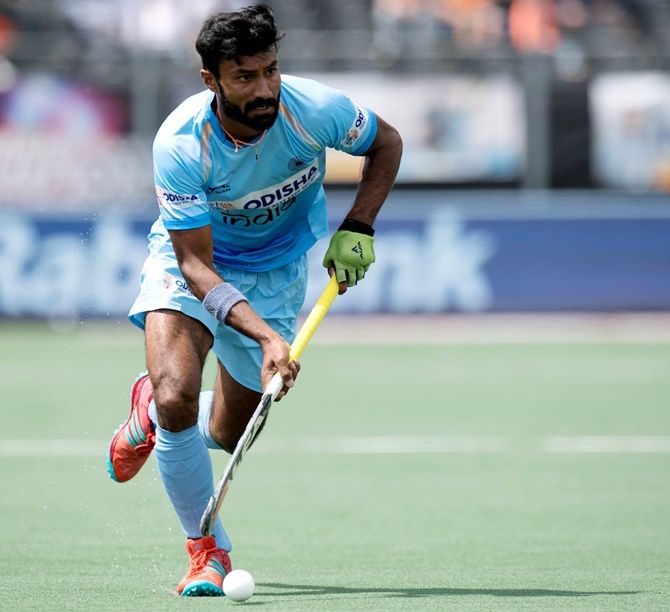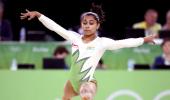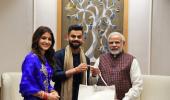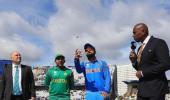
Indian men's hockey team vice-captain Surender Kumar, on Wednesday, said the upcoming Sultan Azlan Shah Cup will be a good opportunity for youngsters to test themselves ahead of the qualifying tournaments for 2020 Olympics.
India will be fielding a young squad at the 28th Sultan Azlan Shah Cup with the likes of Hardik Singh, Vivek Sagar Prasad, Sumit, Nilakanta Sharma, Sumit Kumar (Junior), Gurinder Singh, Simranjeet Singh and Gurjant Singh, among others. They have shown tremendous potential after making their international debut with the senior team.
"The Sultan Azlan Shah Cup has always been a great platform to test youngsters and see how they adapt to international standards. Their experience will grow ahead of the major (2020 Olympic Games qualifying) tournaments we play this year," said Surender.
"Some of these players have done very well at the FIH Champions Trophy and 2018 Men's World Cup and carry a lot of confidence. And we have been speaking to them regularly about handling pressure especially in situations when we are one goal down or two goals down. Their good show will only be beneficial for our team in the lead up to the 2020 Olympic Games in Tokyo," he added.
The Malaysia-bound team has been going through the grind in soaring summer heat at the Sports Authority of India campus in Bengaluru.
Surender said the team felt that training in the afternoon will help them acclimatise to the weather in Ipoh, where the temperature will hover around 34-36 degrees when India play their matches.
"It will be just about the same conditions in Ipoh but maybe a bit more humid," said the vice-captain.
Speaking about India's chances in the tournament, starting on March 23, with Malaysia, Japan, Korea, Canada, Poland in the fray, Surender emphasised that their goal is to win the gold.
Haile Gebrselassie slams IAAF move to cut Diamond League disciplines
The IAAF's decision to limit the longest event in the Diamond League circuit to 3,000 metres will "disproportionately affect" Ethiopia and Kenya, two powerhouses of middle and long-distance events, running great Haile Gebrselassie has said.
After a meeting in Doha, the International Association of Athletics Federations (IAAF) Council said on Monday the circuit will have a trimmer look and fewer meetings as the one-day competitions aim for a more consistent and fast-moving format.
Meetings will be reduced from 14 to 12 competitions, while the number of disciplines will be cut from 32 to 24 with 12 each for men and women.
But Ethiopian Haile, considered by many as the greatest distance athlete of all-time and who - alongside compatriot and rival Kenenisa Bekele - went chasing records to extraordinary effect in the 5,000m and 10,000m, said the move was "unfair" to countries that traditionally excelled in those races.
"It is a sad decision that will disproportionately affect Ethiopia and Kenya, as well as East Africa as a whole," he told Reuters in an interview.
"Some Asian countries have also been making strides in middle- and long-distance. At a time when the (governing) body needed to exert its maximum effort to boost athletics worldwide, it has taken a decision that is tragic and unfair."
The Diamond League, the IAAF's top competition outside the Olympics and world championships, at present has two end-of-season finals, with Zurich hosting one-half of the disciplines and Brussels the other.
The circuit, which celebrates its 10th season beginning in May, currently features nine races for men and women, including the 3,000m steeplechase and 5,000m, and seven field events - high jump, pole vault, long jump, triple jump, shot put, discus and javelin.
Haile said the Diamond League, alongside other events, has long been a competition where Ethiopia and Kenya have tussled for east African track dominance.
"Its (Diamond League) prestige will also be affected. Middle- and long-distance competitions were among the main draws at the time myself, Kenenisa and others competed. It will deprive fans of the chance to watch some of the world's best athletes."
WADA president says proved right over Russian re-admission
The World Anti-Doping Agency has been vindicated over its decision to readmit Russia's anti-doping agency six months ago, its president Craig Reedie said on Wednesday.
In particular, Reedie said that Russia's decision to allow access to its Moscow laboratory following readmission of RUSADA was a "game changer."
RUSADA was suspended in 2015 after a WADA-commissioned report outlined evidence of systematic, state-backed doping in Russian athletics.
Another report the following year documented more than 1,000 doping cases across dozens of sports, notably at the Winter Olympics that Russia hosted in Sochi in 2014. Russia has denied state involvement in doping.
In a controversial decision last September, WADA voted to conditionally restore RUSADA's accreditation as long as it allowed inspectors access to the tainted Moscow lab and data to which it had long been denied.
"Just as it was the correct decision to declare RUSADA non-compliant way back in November 2015, the decision which WADA's executive committee took on Sept 20, 2018 (to readmit Russia) was, in my view, also the right one for clean sport," Reedie told WADA's annual symposium.
"Clearly it was not an easy decision for the (WADA) executive committee, I fully understand the reasons against it, but in light of the events that have occurred since it was made, it has proven to be the right one," he added.
WADA said last week it had completed a painstaking process of uploading more than 1.5 million files of doping data mined from the Moscow lab and would start assessing the information to ensure it is complete and authentic.
"It is undisputable that accessing the laboratory data was a major step forward in this saga," said Reedie, adding that WADA needed to ensure that "the data is both complete and authentic."
He said WADA had to sift through 24 terabytes of information -- the equivalent of more than 400,000 hours of music.
"The data, if authentic and complete, will be a game changer," he said. "It will be absolutely crucial to build strong cases against those athletes who have cheated and exonerate other athletes suspected of having participated in widespread doping."
Reedie added that athletes both inside and outside in Russia had been "in limbo" until last September, a situation which he said "served nobody."
He also pointed out that Russian athletes had continued to compete in many sports even after RUSADA was declared non-compliant as WADA had "no authority" on participation.












 © 2025
© 2025